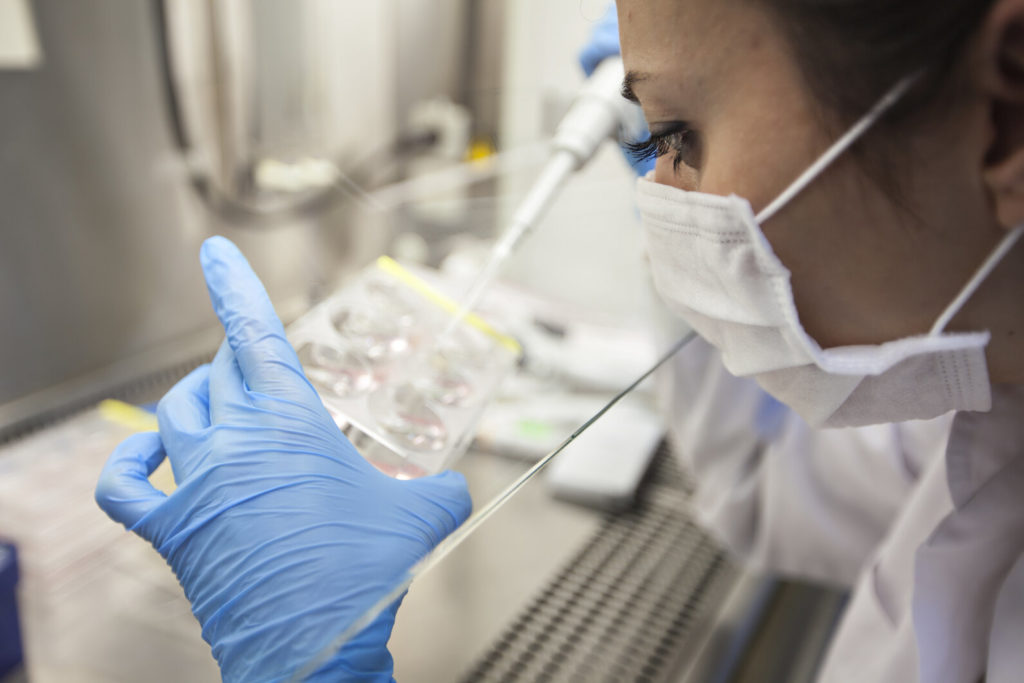All You Need to Know About Fertility Tests for Women
Frankly, aside from being an extremely enjoyable pastime, a healthy, active sex life comes with various benefits for both you and your partner. For example, regularly participating in partnered sex (loosely defined as once or twice per week) can provide the following health benefits:
- Stress relief
- Increased immune response
- Lower blood pressure and improved heart health
- Better sleep
- Increased self-esteem and mood, and
- Improved closeness with your partner
When Infertility Interferes
For many men and women above the age of 18, the best advantage of sex is, of course, the potential to create a baby. However, when you and your partner are trying for a baby and are frequently engaging in sexual intercourse with no baby in sight, the resulting stress and worry can make sex less enjoyable.
Fortunately, although many physicians begin to consider a couple infertile once they’ve been trying to conceive for 12 months, the vast majority of women under 40 manage to conceive naturally within the second year of trying. For context, a widely accepted study found that only 6% of women 34 and under and only 9% of women 40 and under remained unable to conceive past year two. Still, many women choose to begin exploring the cause of any infertility via a fertility test kit or a visit to a physician at this time.
Lingering Fertility Questions

It’s important for couples entering year three (or more) of infertility to begin asking questions to determine potential reasons pregnancy remains elusive. To do so, it’s relatively common practice to head to a general practitioner, who may be able to point out red flags in your health habits that could contribute to difficulty conceiving. However, note that roadblocks to conceiving can come in many forms, and you may need to address multiple issues within both yourself and your partner to have your best chance at conceiving.
If you choose to have a workup by your regular physician or a fertility specialist, you’ll likely need to answer questions including:
- Medical histories, such as surgeries, illnesses, and chronic health problems
- Prescription medications you take regularly
- Substances you regularly use, including illegal drugs, alcohol, nicotine, and caffeine
- History of exposure to hazardous chemicals or radiation
- Sexual habits, including sexual frequency and history of STDs
- Any past pregnancies and their outcomes
- Frequency, regularity, and nature of your periods, including any spotting, missed periods, changes in flow, or large clots
- Methods of birth control you’ve used
- Whether your partner uses tight-fitting or constrictive underwear, which can lead to reduced sperm production and motility
Fertility Testing

As mentioned earlier, there are often several root causes that can contribute to infertility, and between you and your partner, you may exhibit a combination. For that reason, testing for multiple factors is often the best way to reveal the cause of infertility so you can address any issues right away. We’ve compiled a list of the most common fertility tests to provide an overview of the tests you may receive:
Blood and Saliva Testing
While you can certainly request blood and saliva testing panels from a physician or other specialist, female fertility tests at home allow you to have testing done in more comfortable surroundings. Look for a fertility test online with the following tests:
- Ovulation testing. To conceive, you must ovulate or release an egg. Ovulation testing generally checks for the presence of hormones that precede or signify ovulation, including:
- Luteinizing hormone (LH)—this hormone triggers the egg’s release and drastically increases just before you ovulate. Testing should be done on day two or three of your cycle.
- Progesterone (Pg)—increases in this hormone occur during ovulation, and levels should be compared before and after ovulation.
- Follicle-stimulating hormone (FSH) testing. This hormone stimulates the growth of the egg within the ovaries before ovulation. However, high levels of FSH can signal infertility. FSH levels should be checked around day three of your cycle.
- Anti-Mullerian hormone (AMH) testing. This hormone can provide information regarding how many eggs you have stored in your body or your “ovarian reserve.” Higher numbers indicate a better chance of conception, although experts remain divided regarding the importance of AMH.
- Estrone (E1), estradiol (E2), and estriol (E3) testing. These hormones are estrogens, or female sex hormones, which hold various functions within the body and reproductive system. Estrone is the primary hormone made after menopause when menstruation ceases, and you cannot become pregnant anymore. Estradiol is the primary female hormone produced by non-pregnant women, and estriol is the primary hormone present in pregnant women. Typically, you’ll test for estradiol after ovulation to gauge fertility.
- Thyroid and other hormone testing. The best at-home fertility test kits also include testing for several thyroid hormones and associated factors, including ft3, ft4, thyroid-stimulating hormone (TSH), and thyroid protein antibodies (TPOAb). Vitamin D testing and other important hormones such as free testosterone (T) and cortisol (Cx4) offer a complete fertility profile.
Physical Infertility Testing
Both you and your partner may receive a physical examination (a pap smear for women) to evaluate you for existing sexually transmitted infections—gonorrhea, chlamydia, and other infections that could influence fertility. Your partner may also undergo semen testing to evaluate sperm motility and the number of healthy sperm present. If you choose to undergo other physical infertility testing, you may experience:
- Transvaginal ultrasound. This test involves placing a small wand into your vagina to provide ultrasound images of the uterus, ovaries, and cervix to assess these areas for problems.
- Your physician will inject dye through the vagina and take a series of x-rays to determine whether you have blocked fallopian tubes or uterine defects.
- This test involves inserting a thin tube with a camera through the cervix and into the uterus to assess any issues or retrieve tissue samples for uterine biopsy.
- If the above tests indicate a potential issue—or if no other test is conclusive, a physician may suggest inserting a camera through a small incision in your abdomen to check for scarring, endometriosis, and other issues.
Consider Starting with a Fertility Test Kit
Of course, if you and your partner have just begun trying to conceive or wish to get an overall picture of your fertility before beginning—you will not require physical testing. You may not even need physical testing at all, should you identify hormone imbalances contributing to infertility in the early stages. As fertility specialists are often not covered by insurance—or may be only partially covered—a female fertility test at home could be a cost-saving and time-saving option.
Overall, we recommend researching the best at-home fertility test for your needs among the numerous options available. Here at Compounding Pharmacies of America, we offer a full fertility profile panel, as well as vitamin D (25OH, D2, D3), and both estriol and estrone single test panels. When completed in conjunction with a physical examination by both you and your partner, as well as any necessary physical testing, the majority of couples will receive answers regarding why conception has not occurred.
For more information about fertility testing or other at-home medical test kits, please consult one of our compounding pharmacists.
Chief Operating Officer, The Compounding Pharmacy of America
Matthew Poteet, Pharm.D. graduated with Honors from Lee University with a Bachelors of Science in Biological Science. After his undergraduate training, he completed the Doctor of Pharmacy program at Mercer University Southern School of Pharmacy, graduating in 2004. Dr. Poteet has spent much of his pharmacy career on staff at two of the most prestigious academic teaching hospitals in the Southeast; Emory University in Atlanta and Vanderbilt University Medical Center in Nashville. At these institutions he received extensive experience and training in sterile products compounding.
He returned home to East Tennessee in 2010, where he has held the position of Pharmacy Director at two sterile products pharmacies in Knoxville. Matthew lives in Knoxville with his wife, Chris. Dr. Poteet is Tennessee’s first Board Certified Anti-Aging Pharmacist by the American Academy of Anti-Aging Medicine.


 Subscribe to Our Newsletter
Subscribe to Our Newsletter


